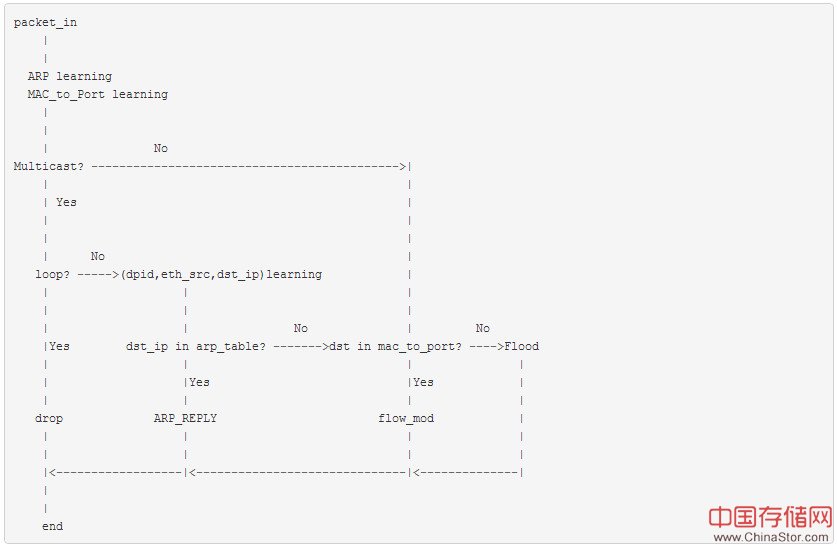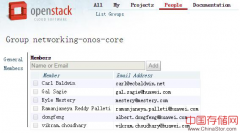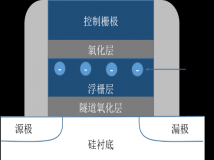前言在传统网络中,存在着一定的广播流量,占据了一部分的网络带宽。同时,在有环的拓扑中,如果不运行某些协议,广播数据还会引起网络风暴,使网络瘫痪。传统的解决方案是运行STP(生成树协议),来解决环路带来的风暴隐患。但是这样的难题在SDN之后,解决起

前言
在传统网络中,存在着一定的广播流量,占据了一部分的网络带宽。同时,在有环的拓扑中,如果不运行某些协议,广播数据还会引起网络风暴,使网络瘫痪。传统的解决方案是运行STP(生成树协议),来解决环路带来的风暴隐患。但是这样的难题在SDN之后,解决起来似乎变得要简单一些。该篇文章将介绍如何在控制器RYU上开发ARP代理模块,用于代理回复ARP请求,以及解决环状拓扑风暴的问题。
算法逻辑
具体的算法流程图如下:

解决环路风暴
在回复ARP请求之前,必须要解决的是网络环路问题。我们的解决方案是:以(dpid, eth_src,arp_dst_ip)为key,记录第一个数据包的in_port,并将从网络中返回的数据包丢弃,保证同一个交换机中的某一个广播数据包只能有一个入口,从而防止成环。在此应用中默认网络中发起通信的第一个数据包都是ARP数据包。
Python| 1 | sw[(datapath.id, eth_src, arp_dst_ip)] = in_port |
代码如下: Python
| 12345678910111213 | if eth_dst == ETHERNET_MULTICAST and ARP in header_list: arp_dst_ip = header_list[ARP].dst_ip if (datapath.id, eth_src, arp_dst_ip) in self.sw: # Break the loop if self.sw[(datapath.id, eth_src, arp_dst_ip)] != in_port: out = datapath.ofproto_parser.OFPPacketOut( datapath=datapath, buffer_id=datapath.ofproto.OFP_NO_BUFFER, in_port=in_port, actions=[], data=None) datapath.send_msg(out) return True else: self.sw[(datapath.id, eth_src, arp_dst_ip)] = in_port |
ARP回复
解决完环路拓扑中存在的广播风暴问题之后,我们还需要利用SDN控制器可获取网络全局的信息的能力,去代理回复ARP请求,从而减少网络中泛洪的ARP请求数据。这个逻辑非常简单,和二层学习原理基本一样,也是通过自学习主机ARP记录,再通过查询记录并回复。具体代码实现如下:
Python| 12345678910111213141516171819202122232425262728293031323334353637383940 | if ARP in header_list: hwtype = header_list[ARP].hwtype proto = header_list[ARP].proto hlen = header_list[ARP].hlen plen = header_list[ARP].plen opcode = header_list[ARP].opcode arp_src_ip = header_list[ARP].src_ip arp_dst_ip = header_list[ARP].dst_ip actions = [] if opcode == arp.ARP_REQUEST: if arp_dst_ip in self.arp_table: # arp reply actions.append(datapath.ofproto_parser.OFPActionOutput( in_port) ) ARP_Reply = packet.Packet() ARP_Reply.add_protocol(ethernet.ethernet( ethertype=header_list[ETHERNET].ethertype, dst=eth_src, src=self.arp_table[arp_dst_ip])) ARP_Reply.add_protocol(arp.arp( opcode=arp.ARP_REPLY, src_mac=self.arp_table[arp_dst_ip], src_ip=arp_dst_ip, dst_mac=eth_src, dst_ip=arp_src_ip)) ARP_Reply.serialize() out = datapath.ofproto_parser.OFPPacketOut( datapath=datapath, buffer_id=datapath.ofproto.OFP_NO_BUFFER, in_port=datapath.ofproto.OFPP_CONTROLLER, actions=actions, data=ARP_Reply.data) datapath.send_msg(out) return Truereturn False |
后语
在环状拓扑中解决广播风暴问题基本都是使用STP协议,而SDN的网络架构,给我们提供了一个更高效的解决方案。不仅如此,我们还可以在解决风暴之后,进一步完成ARP代理应用。然而这个简单的APP,并没有很好地解决ARP的问题,因为ARP也有生存时间。而过时的数据会影响网络的正常运行,所以,进一步的优化将是设置ARP记录的刷新时间。以及sw{dpid, eth_src,arp_dst_ip}的刷新时间。以保证数据的有效性。
推而广之,我们可以按照这样的模式去处理其他的广播数据,如DHCP。更多的功能数据包或者信令数据包的代理,都可以模仿本篇的流程实现。文章的最后,附上完整的代码实现。
Python| 123456789101112131415161718192021222324252627282930313233343536373839404142434445464748495051525354555657585960616263646566676869707172737475767778798081828384858687888990919293949596979899100101102103104105106107108109110111112113114115116117118119120121122123124125126127128129130131132133134135136137138139140141142143144145146147148149150151152153154155156157158159160161162163164165166167168169170171172 | # Author:muzixing# Time:2014/10/19# from ryu.base import app_managerfrom ryu.controller import ofp_eventfrom ryu.controller.handler import CONFIG_DISPATCHER, MAIN_DISPATCHERfrom ryu.controller.handler import set_ev_clsfrom ryu.ofproto import ofproto_v1_3from ryu.lib.packet import packetfrom ryu.lib.packet import ethernetfrom ryu.lib.packet import arp ETHERNET = ethernet.ethernet.__name__ETHERNET_MULTICAST = "ff:ff:ff:ff:ff:ff"ARP = arp.arp.__name__ class ARP_PROXY_13(app_manager.RyuApp): OFP_VERSIONS = [ofproto_v1_3.OFP_VERSION] def __init__(self, *args, **kwargs): super(ARP_PROXY_13, self).__init__(*args, **kwargs) self.mac_to_port = {} self.arp_table = {} self.sw = {} @set_ev_cls(ofp_event.EventOFPSwitchFeatures, CONFIG_DISPATCHER) def switch_features_handler(self, ev): datapath = ev.msg.datapath ofproto = datapath.ofproto parser = datapath.ofproto_parser # install table-miss flow entry # # We specify NO BUFFER to max_len of the output action due to # OVS bug. At this moment, if we specify a lesser number, e.g., # 128, OVS will send Packet-In with invalid buffer_id and # truncated packet data. In that case, we cannot output packets # correctly. match = parser.OFPMatch() actions = [parser.OFPActionOutput(ofproto.OFPP_CONTROLLER, ofproto.OFPCML_NO_BUFFER)] self.add_flow(datapath, 0, match, actions) def add_flow(self, datapath, priority, match, actions): ofproto = datapath.ofproto parser = datapath.ofproto_parser inst = [parser.OFPInstructionActions(ofproto.OFPIT_APPLY_ACTIONS, actions)] mod = parser.OFPFlowMod(datapath=datapath, priority=priority, idle_timeout=5, hard_timeout=15, match=match, instructions=inst) datapath.send_msg(mod) @set_ev_cls(ofp_event.EventOFPPacketIn, MAIN_DISPATCHER) def _packet_in_handler(self, ev): msg = ev.msg datapath = msg.datapath ofproto = datapath.ofproto parser = datapath.ofproto_parser in_port = msg.match['in_port'] pkt = packet.Packet(msg.data) eth = pkt.get_protocols(ethernet.ethernet)[0] dst = eth.dst src = eth.src dpid = datapath.id header_list = dict( (p.protocol_name, p)for p in pkt.protocols if type(p) != str) if ARP in header_list: self.arp_table[header_list[ARP].src_ip] = src # ARP learning self.mac_to_port.setdefault(dpid, {}) self.logger.info("packet in %s %s %s %s", dpid, src, dst, in_port) # learn a mac address to avoid FLOOD next time. self.mac_to_port[dpid][src] = in_port if dst in self.mac_to_port[dpid]: out_port = self.mac_to_port[dpid][dst] else: if self.arp_handler(header_list, datapath, in_port, msg.buffer_id): # 1:reply or drop; 0: flood print "ARP_PROXY_13" return None else: out_port = ofproto.OFPP_FLOOD print 'OFPP_FLOOD' actions = [parser.OFPActionOutput(out_port)] # install a flow to avoid packet_in next time if out_port != ofproto.OFPP_FLOOD: match = parser.OFPMatch(in_port=in_port, eth_dst=dst) self.add_flow(datapath, 1, match, actions) data = None if msg.buffer_id == ofproto.OFP_NO_BUFFER: data = msg.data out = parser.OFPPacketOut(datapath=datapath, buffer_id=msg.buffer_id, in_port=in_port, actions=actions, data=data) datapath.send_msg(out) def arp_handler(self, header_list, datapath, in_port, msg_buffer_id): header_list = header_list datapath = datapath in_port = in_port if ETHERNET in header_list: eth_dst = header_list[ETHERNET].dst eth_src = header_list[ETHERNET].src if eth_dst == ETHERNET_MULTICAST and ARP in header_list: arp_dst_ip = header_list[ARP].dst_ip if (datapath.id, eth_src, arp_dst_ip) in self.sw: # Break the loop if self.sw[(datapath.id, eth_src, arp_dst_ip)] != in_port: out = datapath.ofproto_parser.OFPPacketOut( datapath=datapath, buffer_id=datapath.ofproto.OFP_NO_BUFFER, in_port=in_port, actions=[], data=None) datapath.send_msg(out) return True else: self.sw[(datapath.id, eth_src, arp_dst_ip)] = in_port if ARP in header_list: hwtype = header_list[ARP].hwtype proto = header_list[ARP].proto hlen = header_list[ARP].hlen plen = header_list[ARP].plen opcode = header_list[ARP].opcode arp_src_ip = header_list[ARP].src_ip arp_dst_ip = header_list[ARP].dst_ip actions = [] if opcode == arp.ARP_REQUEST: if arp_dst_ip in self.arp_table: # arp reply actions.append(datapath.ofproto_parser.OFPActionOutput( in_port) ) ARP_Reply = packet.Packet() ARP_Reply.add_protocol(ethernet.ethernet( ethertype=header_list[ETHERNET].ethertype, dst=eth_src, src=self.arp_table[arp_dst_ip])) ARP_Reply.add_protocol(arp.arp( opcode=arp.ARP_REPLY, src_mac=self.arp_table[arp_dst_ip], src_ip=arp_dst_ip, dst_mac=eth_src, dst_ip=arp_src_ip)) ARP_Reply.serialize() out = datapath.ofproto_parser.OFPPacketOut( datapath=datapath, buffer_id=datapath.ofproto.OFP_NO_BUFFER, in_port=datapath.ofproto.OFPP_CONTROLLER, actions=actions, data=ARP_Reply.data) datapath.send_msg(out) return True return False |
转载自:李呈博客@李呈,http://www.muzixing.com/pages/2014/10/19/ji-yu-sdnde-ryuying-yong-arp_proxy.html
声明: 此文观点不代表本站立场;转载须要保留原文链接;版权疑问请联系我们。

































